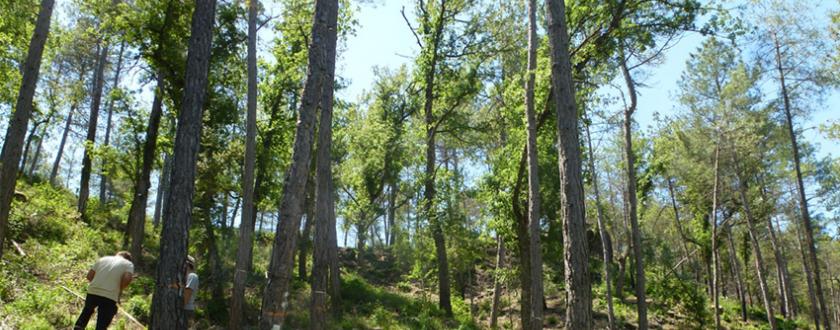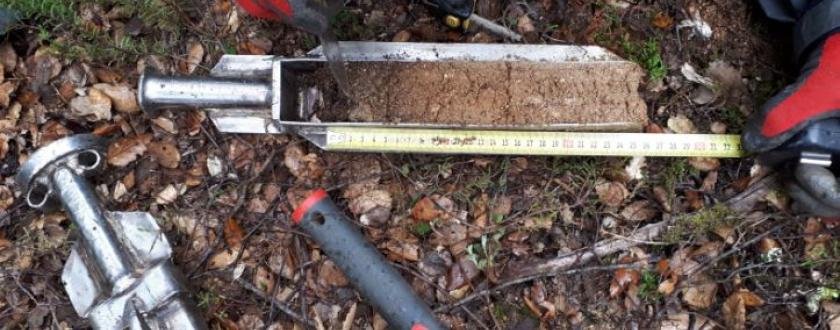LIFE CLIMARK: Forest management promotion for climate change mitigation through the design of a local climate credits market
Description of the case study
European forests play a crucial role in Europe’s carbon balances—their climate change mitigation impact accounts for 13% of all EU emissions. This is mainly due to their carbon storage capacity, carbon fixation in trees and in wood products, and their replacement of fossil fuels. However, in recent years the first symptoms of forest carbon sink saturation have been observed and are predicted to get worse. Reversing this trend will require forest management practices which strengthen the capacity of forests to mitigate the effects of climate change. There are currently no specific incentives in place to encourage this forest management approach, despite being crucial to guaranteeing forest profitability in the Mediterranean.
The LIFE CLIMARK project contributes to climate change mitigation and adaptation by increasing the carbon sink capacity of Mediterranean forests and protecting their carbon stocks. It promotes multifunctional forest management through the creation of a climate credits market for incentivising innovative forest management.
The main objectives of the CLIMARK project are to contribute to climate change mitigation and increase the carbon sink capacity of Mediterranean forests by fostering multifunctional and mitigative forest management through the creation of a climate credits market. The multifunctional forest management proposed is based on three pillars: carbon, water and biodiversity.
The specific objectives of the project are as follows:
- Maintain and improve the mitigating capacity of forests in Mediterranean Europe.
- Design a local ‘climate credits’ market to incentivise multifunctional and mitigative forest management.
- Raise awareness and provide training and the requisite tools to all those interested in compensating their emissions through ‘climate credits’ .
The project actions cover various forest areas and landscape units distributed across the Catalan Pyrenees: Els Aspres, Capçaleres del Llobregat, Replans de Berguedà and La Vall de Rialp. The actions are being replicated in the Veneto region of Italy.
The solutions taken forward in the project are as follows:
- Environmental assessment of 6 landscape units and selection of pilot stands to be managed.
- Implementation of forest management practices and plantations to gauge the impact against the selected indicators. These actions comprise the following:
# Management of forest masses being regenerated following fires (Quercus suber, Pinus halepensis, P. sylvestris, Q. faginea).
# Forest management in adult forests (Q. suber, P. halepensis, P. sylvestris, P. nigra).
# Forestry and agroforestry plantations.
# Management practices which impact soil carbon.
# Strategic forest fire prevention.
- Follow-up and monitoring of the actions implemented. Definition of calculation methodologies.
- Design and pilot testing of a climate credits market based on scientific knowledge and local participation.
- Communication and dissemination of the results and replication of the project.
The project actions implemented across the Catalan Pyrenees are as follows:
# Els Aspres: action will be taken across a total of 20 ha on masses in post-fire regeneration and adult cork oak masses (Q. suber).
# Capçaleres del Llobregat: action will be taken across a total of 15 ha on Scots pine masses in the Pyrenees totalling 5 ha.
# Replans de Berguedà: action will be taken across a total of 15 ha on masses in post-fire regeneration and adult Scots pine masses.
# La Vall de Rialp: action will be taken across a total of 20 ha on post-fire regeneration oak groves (Quercus faginea) and adult European black pine masses.
Case study developed, implemented and partly funded as a climate change adaptation measure.
Centre de la Propietat Forestal de Catalunya, Consiglio Nazionale delle Ricerche-Istituto per i sistemi Agricoli e Forestali del Mediterráneo, Consorci Centre de Ciència i Tecnología Forestal de Catalunya, Oficina Catalana del Canvi Climàtic, University of Lleida.
Additional Information
Project promoted and coordinated by the Centre de la Propietat Forestal de Catalunya, in partnership with Consiglio Nazionale delle Ricerche-Istituto per i sistemi Agricoli e Forestali del Mediterráneo, Consorci Centre de Ciència i Tecnología Forestal de Catalunya, Oficina Catalana del Canvi Climàtic and the University of Lleida. The project also includes the participation of forest associations pertaining to each uncultivated public land area included in the study zone as well as representatives from local action groups, town halls and local councils. An expert committee has also been established comprising representatives from various European entities who bring high-level knowledge in fields such as carbon fixation, biodiversity, water and evaluation of forest and forest management services.
Success: all stakeholders along the forest management chain are involved in the project; innovative voluntary climate credits market; development of an independent climate credits market supervisor.
Limiting: few measures implemented to manage climate credits; lack of management culture focussed on forest carbon.
The project has a total budget of €1,212,883.00, of which €716,947 is funded by the European LIFE Programme and the remaining from the five project partners.
This initiative was funded by the 2017 round of EU LIFE Programme grants.
2017-2021 (4 years - in progress)
Reference information
PYRENEAN CLIMATE CHANGE OBSERVATORY
Avenida Nuestra Señora de la Victoria, 8
22.700 - Jaca
Huesca - España
+34 974 36 31 00
info_opcc@ctp.org






